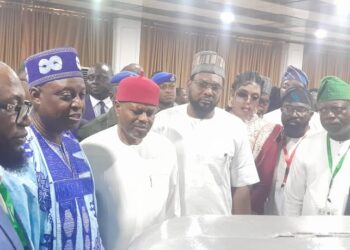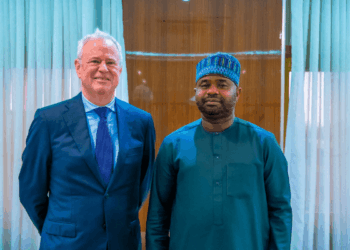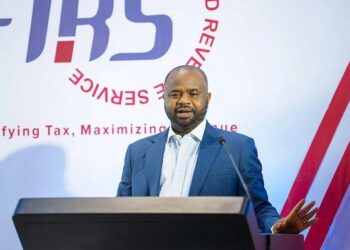Dr Olukunle Iyanda, FCA, SFNLI is a visionary and award-winning leader with over 30 years of experience in various industries, such as manufacturing, healthcare, management consulting, and higher education. He is the founder and CEO of BROOT Consulting, a firm that helps organizations achieve digital transformation, innovation, and strategic excellence. He is also the managing partner/CEO (West & Central Africa) for the DesignThinkers Group, a global network of design-driven innovators.
He was previously the vice president/chief operating officer (Jan 2016 – Feb 2018) of the Tristate Healthcare System. During that time, he nurtured the organization into a recognized tertiary healthcare brand in Nigeria. He was a pioneer leader at Babcock University.
He is a Senior Fellow of the Nigeria Leadership Institute (SFNLI), Fellow of the Institute of Chartered Accountants of Nigeria (FCA), Associate of Nigeria Institute of Taxation Member, member of the Chartered Institute of Management, UK, American College of Healthcare Executives. A Certified Information System Auditor; and Member, Chartered Institute of Management, UK. He holds an MBA from Olabisi Onabanjo University focusing on e-commerce, an MSc in Corporate Governance from Leeds Beckett University, Leeds, UK, and a PhD in Information System Management from Walden University, Minnesota, USA.
In this interview with NATIONAL ECONOMY, he said Nigeria needs to invest in technological infrastructure to optimize the benefits of the nation’s digital economy among others.
There seems to be a global shift to the digital economy and what it can bring to the financial fortune of any country. Is Nigeria ready to harness the prospects of the digital economy?
I believe we are on the right track to a digital revolution. We have a youthful entrepreneurial population and are home to the largest concentration of startups in Africa. Lagos is globally acknowledged as a leading African tech hub. These achievements notwithstanding, the digital divide remains a significant challenge. As of 2023, Nigeria had 122.5 million internet users, but with an internet penetration rate of only 55.4%, nearly 45% of the population remains unconnected. This figure rises to 61% in rural areas, limiting access to digital services. Addressing these challenges requires a comprehensive approach to bridge the digital divide, including targeted investments in digital infrastructure and initiatives to provide digital skills training to underserved communities. Collaboration between the government, private sector, and various stakeholders to harness Nigeria’s digital potential fully potential.
The private sector is already making waves, with Nigeria home to the largest concentration of startups in Sub-Saharan Africa. Companies like Paystack, Flutterwave, Andela, Konga, and Flying Doctors are trailblazing in various sectors, often without significant government support. Imagine the possibilities if we had robust, intentional support similar to what’s seen in countries like China or India. The benefits to the nation could far outweigh the costs, potentially yielding a thousand-fold return on investment.
Leadership is vital in this journey. We need leaders who prioritize national development over self-interest, leaders who can envision and execute the right strategies. As the CEO of a Consulting firm specializing in Innovation and Strategy, I am at a vantage point to commend the current Minister of Communication and Digital Economy, Dr. Bosun Tijani, for his commendable efforts. His leadership is helping to fast-track the development of Nigeria’s digital economy, setting the stage for a prosperous future.
The country has shown commitment to digital transformation through initiatives like the National Digital Economy Policy and Strategy (NDEPS) and the National Broadband Plan (NBP), laying out strategic roadmaps for infrastructure development and enhancing digital skills. If there is no policy somersault and we demonstrate enough commitment, in the next 10 years, Nigeria should be home to about 25Unicorns. We have what it takes; government just needs to play its part.
In terms of financial inclusion, what can be done to get the over 50 million unbanked Nigerians into the financial ecosystem?
The advent of digital technology has contributed significantly to the strides that we made in financial inclusion. For instance, the rate improved to 64.1% in 2020 from 63.2% in 2018; by estimate, approximately 38.1 million adult Nigerians are financially included. The advent of Fintech has undoubtedly contributed significantly to improving financial inclusion. Most of these adults are in rural areas with extremely low penetration and places affected by conflicts, which led to the vandalization of infrastructural support. Increases in security, infrastructure, and energy costs are critical in improving financial inclusion in Nigeria. In 2019, my firm, BROOT Consulting, conducted User-centered Research on one of the biggest commercial banks in Nigeria. To our surprise, walking the streets of Lagos and other cities, we discovered that bank charges discourage some individuals from patronizing the bank. A commercial cab driver narrated how the 15k he kept in the bank in his savings account almost got wiped off due to SMS alerts and other charges. Another set of people we spoke with were shoe cobblers who walk from street to street; their pain point concerns the high cost of keeping accounts with the bank and the trust issue. These issues may appear little to some of us, but they are a big deal for those at the bottom of the pyramid. We need empathy-driven solutions that alleviate their pain point, not the ones that add to it. I believe Fintech has noticed this; hence, most of these people now patronize the likes of Opay, Monipointe, and Palmpay, among others.
Unsurprisingly, other issues that may have contributed to financial exclusion will be found around cultural beliefs. It is, therefore, important that the stakeholders within the economic system constantly promote financial literacy, and this must come from a user-centered perspective rather than our current approach, which makes all our moves suspicious to those struggling to make ends meet.
The government also has a role in boosting financial inclusion; it needs to incentivize the banks to extend their services to unbanked areas through measures like tax breaks, subsidies, or other financial incentives.
How prepared is Nigeria to deploy artificial intelligence to address the critical issue of forensic analysis to detect financial fraud and other malfeasance in the banking system?
AI has come to stay with us, and I am happy with the Vision of the current Minister of Communication and Digital Economy. You will notice that AI is a critical focal point of the Ministry’s strategy. I see AI being used to improve virtually every facet of our economy. Adopting AI can cut down excesses, reduce corruption, and foster operational improvement and transparency in governance. To your question, I believe that going by the current effort of the Ministry and some of the trends in the Private sector, especially the financial industry, AI is expected to play a critical role in forensic analysis to detect financial fraud and malfeasance in the banking system, but there are crucial considerations to address:
As mentioned earlier, we need to invest in technological infrastructure to optimize the benefits of the digital economy. For instance, as of 2023, Nigeria’s broadband penetration stood at only 39.98%. We need to drive down the cost of technology usage to maximize its benefits. We also need to aggressively upscale the expertise of our IT professionals to be proficient in AI and data analytics. Again, I think the Ministry of Communication’s vision of The 3 Million Technical Talent (3MTT) program to equip three million individuals with technical skills over four years, with AI/Machine Learning being one of the twelve focus areas, is commendable. With this type of training, Nigeria will be well-positioned to leverage digital technology. The current approach of creating a collaborative ecosystem is critical; the government should leverage the academia and bridge the gap between “gown and town” to ensure we create centric programs that bring
AI researchers, cybersecurity experts, financial institutions, and regulatory authorities together.
How would you summarise the value of digital transformation to an economy, and do you think Nigeria is there yet?
I believe that digital transformation is a powerful tool for unlocking economic transformation and growth. It can stimulate job creation, enhance economic performance, and improve the overall quality of life. By unlocking substantial market capitalization across all sectors, digital transformation can lead to significant economic gains.
In terms of cost savings and revenue enhancement, digital transformation plays a pivotal role. A study by the Harvard Business Review indicated that while 89% of large global companies are undergoing digital and AI transformation, they have only realized 31% of the projected revenue increase and 25% of the anticipated cost savings. This tells us that there is still more to be done, and we should not forget that between 75-80% of digital transformation projects fail, and the main reason for failure is because of poor change management approach and lack of human centricity.
When done right, digital transformation can instigate transformative change, reshaping markets for products and factors and profoundly altering the nature of business and work. It can also facilitate broader participation of firms in the innovation economy, accelerate the diffusion of new technologies, and foster the development of complementary capabilities in the workforce.
Turning to Nigeria, I believe the current administration, with various policy enhancement and strategies, is well positioned to make a difference in digital transformation; we can accelerate the realization of the benefits of digital transformation when it starts from various government agencies.
Currently, Nigeria is only capturing a small portion of its potential digital economy and will need to make strategic investments to cultivate a dynamic, transformative digital economy; we have the challenges of a shortage of skilled personnel, inadequate regulation, governance, IT infrastructure, and a lack of synergy among key stakeholders pose threats to the achievement of these targets. It is, however, encouraging the Ministry of Communication and Digital Economy’s strategic plan to go in the right direction, and when implemented, it will bridge some of the noticeable gaps. Also commendable is the introduction of the National Single Window (NSW) project. It proves strong commitment and strides towards invigorating the nation’s economy. If properly implemented, the NSW project should simplify and harmonize trade processes by integrating various government agencies, ports, and stakeholders.
In conclusion, while digital transformation offers immense economic growth and development potential, it necessitates strategic investments, policy adjustments, and capacity building.
It is said that corruption cannot thrive without middlemen such as banks. What is your assessment of the state of corporate governance in Nigeria viz-a-viz the anti-graft battle?
The complexity of our society is evident, particularly when measures introduced to rectify issues are exploited, leading to a multitude of unintended problems. This is why I am a strong advocate for human-centric policy and strategy development, as well as operational transformation. We need a complete overhaul of our value system if we are to make meaningful progress as a people.
Yes, we have made some good progress on corporate governance. However, weak regulatory oversights continue to lead to unnecessary abuse by lots of directors. A recent publication revealed that Nigerian bank directors owed commercial banks close to N600 billion, which should be an eye-opener. If history is anything to go by, you will realize that most of the collapses associated with banks result from unethical practices by the directors. This highlights the need for corporate governance, particularly in the banking sector, to be at the forefront of our national discourse.
Many banking executives live larger than life, leading lifestyles that we know cannot be supported by legitimate sources of income. Yet, we often look the other way. The Nigerian Code of Corporate Governance, released by the Financial Reporting Council in 2019, aims to institutionalize best practices in corporate governance within Nigerian companies. However, the effectiveness of corporate governance still faces challenges due to corrupt practices, poor ownership structure, a slow and inefficient judicial process, and a lack of enforcement mechanisms by regulatory bodies.
In the financial sector, corporate governance failures are largely due to the lack of political will to enforce corporate governance laws, deliberate non-compliance with existing corporate governance laws by politically connected organizations, weak enforcement by regulators, and conflicting codes in the country’s corporate governance codes. These factors have enabled abuses in the banking sector, such as manipulating interest rates to favor certain clients or maximize profits, unauthorized access and misuse of customer information for personal gain, and offering and accepting bribes to facilitate loan approvals or other transactions.
There have also been concerns about the non-availability of Naira from ATMs, local trading of Naira, and peddling of new Naira notes by street money hawkers. It’s almost impossible for average citizens to get new notes from the bank. I am glad that the EFCC is addressing the abuse of Naira, which will hopefully curb the peddling of Naira by street hawkers.
What is happening in Nigeria is truly disheartening. We are openly selling our local currency either by the POS agent or by hawkers of new notes, some of whom charge as high as 20%. At a time when POS is not available to small businesses such as gas stations and supermarkets, you go to parties and see hawkers of new notes with POS. This is an aberration. Hopefully, the EFCC will shine a stronger spotlight on many unethical issues stemming from the banking sector.
















Between Depleting Workforce And Declining Productivity